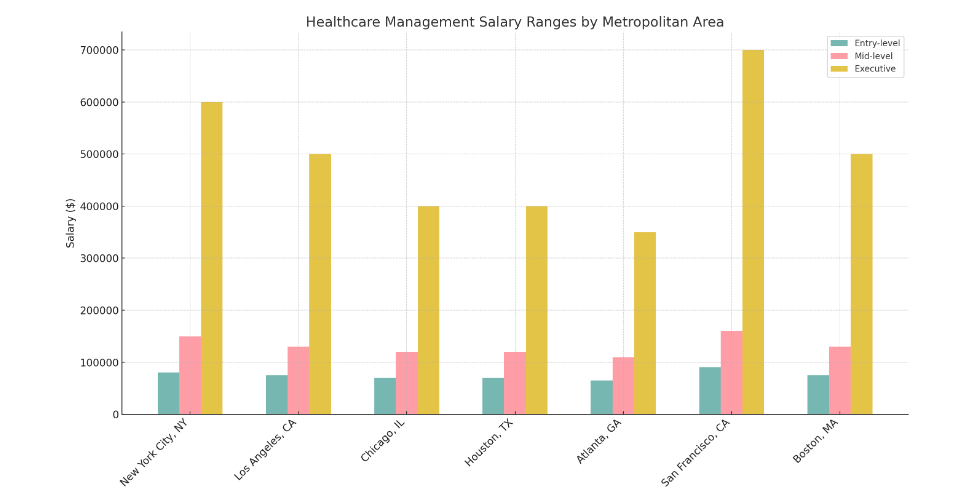Healthcare
Healthcare Management Salary Rates


Navigating the dynamic landscape of healthcare management offers a promising career path marked by both challenges and substantial rewards. As the healthcare industry continues to expand and evolve, understanding the potential financial outcomes of a career in healthcare management becomes increasingly important. The article delves into various aspects of healthcare management salary, from baseline figures and influencing factors to geographical variations and advancement opportunities. Whether you are just starting your career or looking to advance in this field, we provide a thorough overview of what you can expect to earn and how to maximize your salary potential. Explore job-specific salary insights, the impact of workplace settings, and answers to frequently asked questions to equip yourself with the knowledge to thrive in healthcare
What Is Healthcare Management Salary
A healthcare management salary refers to the compensation received by professionals who oversee the operations and administration of healthcare facilities such as hospitals, clinics, and nursing homes. The salaries in this field vary significantly based on factors like experience, education, geographic location, and the specific role within healthcare management. Entry-level positions may offer salaries starting from approximately $50,000 annually, while more experienced managers, especially those in larger facilities or executive roles, can earn well over $100,000 per year. This variance underscores the diverse opportunities and financial rewards available in the healthcare management sector.

Need Help with Medical Essays or Case Studies?
Use our service to deliver first-class papers without breaking a sweat!
Healthcare Management Jobs Salary by State
The landscape of healthcare management salaries varies significantly across different states, reflecting local economic conditions, cost of living, and the density of healthcare facilities. In states like California and New York, where the demand for healthcare services is high, and living costs are substantial, healthcare management salaries often exceed $130,000. Conversely, states with lower costs of living, such as Mississippi and Arkansas, tend to offer lower median salaries, generally below $90,000. The table below gives the state-by-state breakdown of healthcare management salaries, providing a detailed view of the earning potential across the country. Whether you are looking to start a career in healthcare management or considering a relocation, understanding these geographical salary differences can significantly impact your decision-making process.
State | Median Salary ($) | Min. Salary ($) | Max. Salary ($) |
Alabama | 86,000 | 61,000 | 145,000 |
Alaska | 123,000 | 76,000 | NA |
Arizona | 109,000 | 66,700 | 221,000 |
Arkansas | 84,000 | 53,000 | 141,000 |
California | 139,000 | 75,000 | NA |
Colorado | 126,000 | 78,000 | NA |
Connecticut | 126,000 | 80,000 | NA |
Delaware | 134,000 | 86,000 | NA |
District of Columbia | 144,000 | 87,000 | NA |
Florida | 104,000 | 64,000 | 206,000 |
Georgia | 129,000 | 80,000 | 226,000 |
Hawaii | 130,000 | 77,000 | 205,000 |
Idaho | 108,000 | 65,000 | 181,000 |
Illinois | 109,000 | 76,000 | 216,000 |
Indiana | 100,000 | 60,900 | 169,000 |
Iowa | 98,000 | 71,000 | 162,000 |
Kansas | 102,000 | 64,000 | 178,000 |
Kentucky | 98,000 | 58,000 | 173,000 |
Louisiana | 101,000 | 63,000 | 168,000 |
Maine | 106,000 | 72,000 | 177,000 |
Maryland | 131,000 | 81,000 | 229,000 |
Massachusetts | 132,000 | 80,000 | NA |
Michigan | 102,000 | 61,000 | 176,000 |
Minnesota | 114,000 | 77,000 | 180,000 |
Mississippi | 84,000 | 54,000 | 138,000 |
Missouri | 103,000 | 62,000 | 177,000 |
Montana | 103,000 | 67,000 | NA |
Nebraska | 102,000 | 70,000 | 165,000 |
Nevada | 105,000 | 62,000 | 182,000 |
New Hampshire | 123,000 | 78,000 | NA |
New Jersey | 130,000 | 88,000 | NA |
New Mexico | 113,000 | 74,000 | 211,000 |
New York | 145,000 | 85,000 | NA |
North Carolina | 106,000 | 68,000 | 209,000 |
North Dakota | 109,000 | 77,000 | 217,000 |
Ohio | 104,000 | 64,000 | 176,000 |
Oklahoma | 99,000 | 63,000 | 161,000 |
Oregon | 133,000 | 83,000 | 233,000 |
Pennsylvania | 107,000 | 68,000 | 193,000 |
Rhode Island | 123,000 | 79,000 | 205,000 |
South Carolina | 105,000 | 69,000 | 228,000 |
South Dakota | 111,000 | 82,000 | 222,000 |
Tennessee | 104,000 | 63,000 | 199,000 |
Texas | 106,000 | 63,000 | 177,000 |
Utah | 102,000 | 59,000 | 210,000 |
Vermont | 112,000 | 77,000 | 201,000 |
Virginia | 122,000 | 77,000 | 216,000 |
Washington | 136,000 | 89,000 | 225,000 |
West Virginia | 106,000 | 71,000 | 195,000 |
Wisconsin | 125,000 | 85,000 | NA |
Wyoming | 103,000 | 56,000 | 160,000 |
Jobs Overview
Healthcare management entails a diverse range of job roles, each critical to the efficient operation of healthcare facilities across the spectrum. From hospital administrators who ensure that medical services meet quality standards to practice managers in small clinics, the scope of healthcare management is broad. Job titles might include Health Services Manager, Clinical Director, or Nursing Home Administrator, with each position involving distinct responsibilities tailored to specific organizational needs. The demand for these professionals is influenced by factors such as the aging population, advancements in medical technology, and regulatory changes, making healthcare management a dynamic and evolving field. This section provides an overview of various healthcare management roles, highlighting how these positions contribute to the overarching goals of medical and health service facilities and how professionals in these roles navigate the complexities of the healthcare industry.
What Factors Affect the Salary
The compensation packages within healthcare management are shaped by a multitude of determinants that can significantly influence earning potential. Here are some key factors:
- Educational Background and Professional Experience: Advanced degrees like a Master’s in Healthcare Administration (MHA) or relevant MBAs are often prerequisites for higher salary brackets. Furthermore, professionals with a wealth of experience in healthcare management tend to command higher salaries due to their developed skill sets and industry knowledge.
- Geographical Location: The area where a job is located plays a crucial role in salary determination. Metropolitan areas with a higher cost of living typically offer salaries that reflect the need to cover these higher personal expenses. In contrast, wages in rural settings might be lower but come with a lower cost of living.
- Type and Size of the Employer: Larger healthcare facilities or well-funded private sector organizations generally offer more lucrative salaries compared to smaller, nonprofit entities. The financial health and resources of an employer are critical in determining salary scales.
- Role Complexity and Job Responsibilities: Positions that involve more complex decision-making responsibilities, such as a Chief Executive Officer (CEO) or a facility administrator, usually offer higher salaries. The scope of duties directly correlates with compensation levels.
- Market Demand and Sector Trends: Current trends and demands within the healthcare sector also impact salaries. For instance, roles in growing fields like digital health management or specialized areas such as geriatric care management are often in higher demand, pushing salaries upwards.
- Professional Certifications: Obtaining industry-recognized certifications can enhance a manager’s credibility and salary prospects. Certifications such as the Fellow of the American College of Healthcare Executives (FACHE) signal a high level of competence and commitment to the field.
Negotiation Abilities: A professional’s capacity to negotiate salary terms effectively can also play a significant role in the final compensation package offered, impacting both initial salaries and subsequent raises.
Healthcare Management Salary by Workplace
Healthcare management salary can vary markedly based on the workplace environment. Below is a detailed analysis of how salary ranges differ across various healthcare settings, helping to illustrate the potential earning landscape for professionals in this field:
Setting | Description | Salary Range |
Hospitals and Major Healthcare Systems | In these settings, healthcare management positions command some of the industry’s top salaries, especially at the executive level. Large hospitals and renowned systems offer lucrative compensation to attract and retain high-caliber talent. | Entry-level: $50,000 – $70,000 Mid-level: $70,000 – $120,000 Executive: $150,000 – $500,000+ |
Private Medical Practices and Clinics | Positions in smaller settings like private practices and clinics still offer competitive salaries. Earnings can vary with the practice’s size and specialty, with roles such as practice managers being particularly valued. | Practice Managers: $60,000 – $100,000 Mid-level management: $70,000 – $120,000 |
Long-Term Care and Rehabilitation Centers | These facilities typically provide salaries that are competitive with hospitals, reflecting the significant responsibilities involved in managing long-term residential care. | Facility Administrators: $70,000 – $100,000 |
Health Insurance Firms | Roles within health insurance organizations involve overseeing operations and can offer substantial salaries, reflecting the complexity of managing policyholder services and healthcare costs. | Administrators: $60,000 – $120,000 Utilization Managers: $70,000 – $130,000 |
Government Health Departments | Government roles often provide stability and competitive benefits, though salaries might not reach the peaks found in the private sector. | Federal Administrators: $60,000 – $120,000 State/Local Administrators: $50,000 – $100,000 |
Academic and Research Institutions | These positions, particularly in administrative roles at medical schools or universities, offer competitive salaries. These roles often merge healthcare management with academic duties. | Administrative Leaders: $70,000 – $150,000 |
Nonprofit Health Organizations | While possibly offering lower salaries than for-profit sectors, nonprofit roles often provide intangible benefits like mission fulfillment and community impact. | Managers/Administrators: $50,000 – $100,000 |
If you need help with your management course, our essay writer service is open to helping you right now.
Salary by Metropolitan Area

The bar chart shows the median annual salary by position level and metropolitan area based on the data given below. The bars represent different levels of positions (entry-level, mid-level, executive) for each metropolitan area.
🏙️ Metropolitan Area
| 💰 Median Annual Salary
|
New York City, NY
| · Entry-level: $60,000 – $80,000 per year · Mid-level: $80,000 – $150,000 per year · Executive: $200,000 – $600,000+ per year |
Los Angeles, CA | · Entry-level: $55,000 – $75,000 per year · Mid-level: $75,000 – $130,000 per year · Executive: $180,000 – $500,000+ per year
|
Chicago, IL | · Entry-level: $50,000 – $70,000 per year · Mid-level: $70,000 – $120,000 per year · Executive: $150,000 – $400,000+ per year
|
Houston, TX
| · Entry-level: $50,000 – $70,000 per year · Mid-level: $70,000 – $120,000 per year · Executive: $150,000 – $400,000+ per year
|
Atlanta, GA | · Entry-level: $45,000 – $65,000 per year · Mid-level: $65,000 – $110,000 per year · Executive: $140,000 – $350,000+ per year |
San Francisco, CA | · Entry-level: $65,000 – $90,000 per year · Mid-level: $90,000 – $160,000 per year · Executive: $250,000 – $700,000+ per year |
Boston, MA | · Entry-level: $55,000 – $75,000 per year · Mid-level: $75,000 – $130,000 per year · Executive: $180,000 – $500,000+ per year |
How to Earn More in Healthcare Management
In the rapidly evolving field of healthcare management, professionals continually seek avenues to advance their careers and increase their earnings. Rapid advancements in technology, changing regulations, and shifts in patient demographics all contribute to a dynamic work environment. Here are three strategic approaches to potentially enhance your income in healthcare management:
- Advancement Through Education and Certification
Pursuing higher education, such as a Master of Health Administration (MHA) or a Master of Business Administration (MBA) with a focus on healthcare management, can substantially boost your earning potential. Further, acquiring industry-recognized certifications such as the Certified Healthcare Executive (CHE) or the Certified Professional in Healthcare Quality (CPHQ) can affirm your expertise and open doors to higher-paying roles. Engaging in specialized academic pursuits, like researching contemporary issues in nursing, can also provide a competitive edge.
- Specialization and Leadership Development
Specializing in high-demand sectors within healthcare management, such as healthcare informatics, patient care quality improvement, or healthcare financial management, can lead to lucrative leadership opportunities. Ascending to higher positions of authority, such as becoming a department head or taking on executive roles, generally correlates with increased compensation due to the greater responsibilities and strategic impact of these positions.
- Mastery of Data Analytics and Technological Innovation
Proficiency in data analytics and a thorough understanding of technological applications in healthcare, such as electronic health records (EHR) and telehealth systems, are increasingly crucial. Professionals who excel in utilizing these tools to enhance operational efficiencies, improve patient care, and streamline costs are often well-compensated. Their skills in fostering innovation and improving healthcare delivery systems make them valuable assets in the industry. Thus, for those set on a healthcare career path, developing skills in healthcare consultancy can be a wise move to capitalize on these trends.
Conclusion
As we conclude our exploration of healthcare management salary, it’s clear that this field offers a robust pathway for those aspiring to merge their passion for healthcare with the insight of strategic management. With a range of positions from entry-level to executive, the compensation in healthcare management can vary significantly, influenced by factors like education, experience, geographic location, and the type of healthcare facility. Whether you’re just starting your career or are a seasoned professional, the potential for financial growth and professional development in healthcare management is substantial. Embracing continuous learning and seizing opportunities for advancement is crucial to maximizing your healthcare management salary and achieving a rewarding career in this vital industry.

FAQs
Is healthcare manager a good career?
Yes, healthcare management is a highly rewarding career, offering numerous opportunities for professional growth and personal satisfaction. It combines business acumen with a profound impact on patient care and service quality. The field is known for its dynamic environment, driven by ongoing changes in healthcare laws, technology, and patient needs, providing a challenging yet fulfilling career path.
Do you make a lot of money in healthcare management?
Healthcare management can be quite lucrative, especially as you gain more experience and take on higher responsibilities within an organization. Salaries vary widely based on factors such as education, certifications, experience, and geographical location. However, most positions offer competitive salaries that are commensurate with the complexity and significance of the role in the healthcare system.
What is the highest salary in healthcare management?
The highest salaries in healthcare management often exceed $200,000 annually, particularly for senior executive positions like Chief Executive Officer (CEO), Chief Operations Officer (COO), or Chief Financial Officer (CFO) of large healthcare facilities or systems. These top-tier positions demand extensive experience and a robust understanding of both healthcare operations and financial management, often rewarding with substantial compensation packages.
How long does it take to become a manager in healthcare?
The time it takes to become a manager in healthcare can vary depending on one’s educational path and career progression. Typically, it requires at least a bachelor’s degree in healthcare administration, health management, nursing, or a related field, which takes about four years to complete. Many healthcare managers also pursue master’s degrees, adding another two years to their education timeline. Beyond formal education, gaining 3-5 years of experience in lower-level management or supervisory roles is common before advancing to higher management positions. Thus, it could take anywhere from 7 to 10 years after beginning your education to reach a managerial position in healthcare.
Recommended for reading: Nursing Care Plan: Ultimate Guide with Tips & Examples
Source
U.S. Bureau of Labor Statistics. Medical and Health Service Managers. https://www.bls.gov/ooh/management/medical-and-health-services-managers.htm#tab-1

